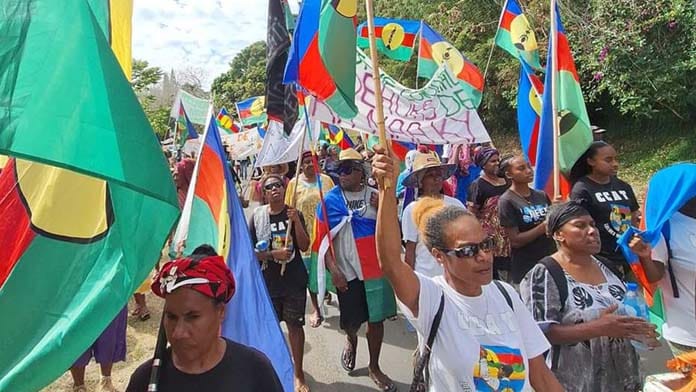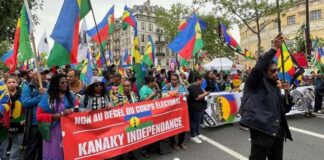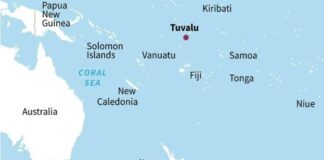Four months after protests first broke out in Kanaky-New Caledonia, the French state continues to repress the Indigenous Kanak people.
On 19 September, police shot and killed Johan Kaidine, 29, and Samuel Moeikia, 30, at the village of Saint Louis, during an early morning raid. The police were hoping to arrest a dozen Kanak activists accused of violent crimes and car-jackings during the May riots.
In the wake of the killings, French officials accused Kanak activists of firing first and claimed that the police were acting in self-defence.
The lethal police raid comes in the context of the ongoing siege of Saint-Louis, long a stronghold of the Kanak independence movement, by the French police and military.
For weeks, police have blocked traffic to and from Saint-Louis, forcing residents to enter and exit on foot, after showing their ID at one of the police checkpoints, according to journalist Nic Maclellan. A temporary barricade of sandbags and barbed wire set up the military is currently being replaced with a full-scale concrete wall.
The siege is periodically punctuated by night-time police operations to arrest leaders of the resistance movement. The killings of Kaidine and Moeikia was preceded by the murder on 10 July of Victorin Rock Wamytan, shot by a French sniper. In this case too, French officials claimed that the police were acting in self-defence.
The Kanak and Socialist National Liberation Front (FLNKS) has accused the French state of waging a war against Saint-Louis, calling 19 September a “black Thursday for the Kanak people”.
Kanaky, which lies only 1300 kilometres off the east coast of Australia, was annexed by France in 1853, leading to a genocidal frontier war against the Indigenous Kanak people.
Since the annexation, the Kanak people have courageously and consistently resisted French colonisation. Major Kanak uprisings were brutally crushed in 1871 and 1917, killing thousands.
The survivors were forced into reserves and restricted from leaving them without permission until after the Second World War. Massive inequality and discrimination persists today. Although the Kanak people make up 40 per cent of the population, they comprise 90 per cent of the prison population.
Uprising and repression
The current unrest in Kanaky was sparked in May when French President Emmanuel Macron passed a new electoral law that would add 25,000 French settlers to the electoral roll, eroding the representation of the Kanak with implications for any future vote on independence.
On 13 May rioting and protests broke out in Noumea, prompting France to deploy 3000 paramilitary police to crush the movement. On 22 May, Macron announced that the electoral reform law would be suspended until 30 June.
Since the dissolution of parliament on 10 June, the law has been suspended indefinitely.
In the meantime, France has continued to rely on brutal repression to prevent further riots. On 19 June, seven Kanak activists were arrested and transferred to detention in France, prompting another round of protests.
There has been a curfew in place since mid-May and it was extended in September to ban travel and gatherings between 6pm and 6am. French authorities also flew another 700 police into Kanaky, reinforcing the 5000 already deployed.
Meanwhile, loyalist settlers have maintained roadblocks around the more affluent suburbs of Noumea, subjecting any Kanak who passes through to humiliating interrogation.
On 24 September, the Kanak people commemorated the 171st anniversary of colonisation with non-violent rallies, while the council of great customary chiefs gathered on Maré Island to declare the sovereignty of the chiefdoms over Kanaky.
While the declaration of sovereignty highlights the illegitimacy of French occupation it is largely symbolic. But it has ruffled the feathers of the Customary Senate, an advisory body set up by the French state in 1998 as part of an Accords process with the independence movement.
France is determined to maintain its colonial domination of Kanaky for both economic and strategic reasons. Kanaky contains 10 per cent of the world’s nickel reserves, and the nickel industry is dominated by the French mining company Eramet. The French ruling class will not easily relinquish the right to exploit Kanak workers.
Additionally, Kanaky forms a vital part of France’s Pacific territories and hosts a French military and maritime base. Alongside its control of the islands of French Polynesia, Wallis and Futuna, and Clipperton, holding the territory gives France a stake in Pacific affairs.
In the midst of growing rivalry between the West and China over the South Pacific, Western powers, including the Australian state, want to keep French imperialism in the Pacific.
We should support the Kanak struggle for independence and decolonisation and the end of French occupation and colonial control.
By Jacob Starling






